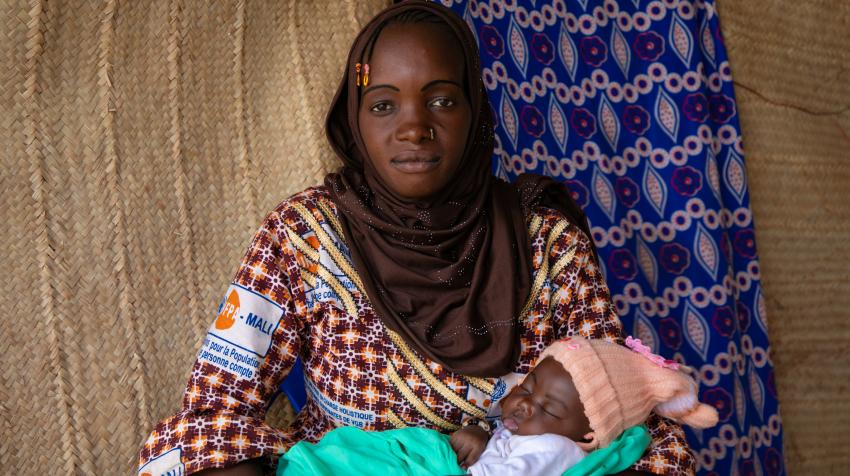May 2016, No. 1 Vol. LIII, Humanitarian Action: A Shared Responsibility
Fifteen years ago, when I joined the humanitarian sector, I believed that article 6 of the Code of Conduct for the International Red Cross and Red Crescent Movement and NGOs in Disaster Relief regulated field practice. It stated “we shall attempt to build disaster response on local capacities… Where possible, we will work through local NGHAs1 as partners in planning and implementation…”. Complementarity with local actors was subsequently emphasized in the 1996 Sphere Project, the 2003 Good Humanitarian Donorship principles, and the 2007 Principles of Partnership.
In Côte d’Ivoire, the Democratic Republic of the Congo (DRC), Mali, the Niger, Senegal and Sierra Leone, I saw good examples of local and international partners working together. I also met many staff members of local and national non-governmental organizations (NGOs) who were dissatisfied with the quality of the partnerships they had with international agencies. Resource distribution was a major area of concern.
In 2013, while taking part in the Practitioner Expert Programme at Tufts University, I interviewed the heads of three West African NGOs that had partnered with international organizations for over a decade. All were adamant that there was little willingness from their international counterparts to allow or help them grow meaningfully for fear of being outperformed. While they acknowledged their own shortcomings, they also gave specific examples of power imbalance.
The head of an Ivorian NGO described a difficult partnership. “We partnered on a food distribution project with an international non-governmental organization (INGO), on a United Nations agency project”, he said. “The following year we applied directly to the United Nations agency. The INGO said they ought to get the project and deal directly with the United Nations agency in Geneva. They got the project but were not able to implement it in the field, so they got back to us and subcontracted us for the very same project. This is no partnership. It is abuse and exploitation. We do the work, they get the funds”.
Insufficient resources, limited access to information, complex procedures, and significantly lower salaries and overhead costs allowed in local and national NGO budgets, as well as local and national NGOs not being permitted to retain staff, were mentioned as negative factors emphasizing the perception of local organizations that they were being discriminated against. One respondent summed up what others had alluded to: “There are capacities in active local NGOs but the system does not seem ready to grant local organizations the place they deserve”.
These observations echoed what I saw in the three years I managed Phases 1 and 2 of the NGO and Humanitarian Reform Project2 in Côte d’Ivoire and the DRC, as well as in Ethiopia, Pakistan and Zimbabwe, where the Project was also implemented. The Project was aimed at reinforcing local, national and international humanitarian NGO voices in influencing the policy and practice of humanitarian reform.
For the last three years, I have served as the Regional Representative in West and Central Africa for the International Council of Voluntary Agencies (ICVA), an NGO coalition bringing together organizations from every continent.
A minority of local and national NGOs partnering with international actors have gained some access to clusters, pooled funding and humanitarian country teams (HCTs), but the vast majority remain in the outer circle of humanitarian decision-making and coordination. Only three national NGOs have a seat on the HCTs in the countries I am covering. Few local or national NGOs receive funds directly from donors, but they tend to fare better in the Central African Republic (CAR) and the DRC, where there are pooled funds. Nevertheless, I am regularly impressed by the quality, creativity, immediate impact and sustainability of projects that such NGOs implement in the field.
I was recently impressed with an intervention modality of the Ivorian NGO Afrique Secours et Assistance, which specializes in the protection of children, women and displaced persons. Afrique Secours et Assistance is implementing projects in the CAR, Côte d’Ivoire and the Niger. It has developed original intervention modalities, including social cohesion projects on conflict resolution mechanisms based on traditional chiefdoms and academic research, adhering to all international humanitarian standards.
Another local NGO emphasized concerns for sustainable interventions in eastern Côte d’Ivoire. It initially implemented a sanitation project in the Duékoué mission, which hosted internally displaced persons (IDPs). Later, with no external funds, it organized returning youth into sanitation teams. These teams continued cleaning their neighbourhoods on a private basis for a small contribution from the inhabitants and ultimately managed to build businesses.
For indigenous African NGOs to get a seat at the humanitarian decision-making table, I think it’s important that effective and principled local, national and regional NGOs change the widespread narrative on their lack of accountability and ability to implement projects. They ensure that examples of untrustworthy or weak national NGOs (NNGOs) do not tarnish the reputation of their wider community. They also need to communicate better on their successes, impact and added value; the knowledge and understanding of complex political and cultural environments they possess; and the cost-effectiveness and long-term thinking by which they operate.
Another aspect that I feel local and national NGOs need to improve to ensure better partnerships is conveying their approaches to accountability to affected people. Many NNGO staff with whom I regularly communicate feel that, due to their direct relationship with communities and long-term interest in the affected population’s real ownership of the projects, they are ahead of INGOs on the issue but lack the right terminology to describe their approaches. It is important that NNGOs articulate and formalize their approaches, frameworks and organizational processes, as accountability can level the playing field.
In Côte d’Ivoire, a local organization that had benefited from an accountability training module I facilitated wrote to me a few months later to follow up. The head of the organization explained that they had always listened to the women with whom they worked; they requested their feedback on project proposals and subsequently adapted their operations. Following the training, they emphasized this aspect in their interaction with their long-standing INGO partner Save the Children and asked for support to reinforce their organizational mechanisms. As a result, the partner doubled the local organization’s budget.
Funding is a major stumbling block, and unless local and national NGOs find sources of alternative funding, they will have a hard time being considered equal to donors or partners that bring more money to the table. Oxfam research showed that between 2007 and 2013, less than 2 per cent of humanitarian assistance funding was provided directly to local and national actors annually.3 Despite encouraging initiatives such as the Charter for Change or the Grand Bargain, these figures will not grow overnight. Other initiatives such as the African NGO consortium comprising Médecins d’Afrique, Afrique Secours et Assistance and Africa Humanitarian Action was founded in the CAR to collectively raise funds under the aegis of the African Union. Other potential models include Femmes de Salem International, which collects funds by coin in Côte d’Ivoire; the Dangote Foundation in Nigeria, which builds the capacities of Nigerian NGOs; the Government of Chad, which channels funds to assist returnees in Chad through Chadian civil society; and diaspora movements, which pass money through community-based organizations.
In several countries in the region where I tried to bring national NGOs together, I saw infighting for visibility, access to money and staff, and coalitions being dissolved immediately after the neutral external facilitator left the country, as there is little trust among organizations. NNGOs have no other choice than to build strong, credible, operational consortia while reinforcing their individual operational capacity and allying with like-minded organizations. Such consortia are extremely diverse, including individuals and faith-based organizations, INGOs, Governments, donor agencies, academia and United Nations agency staff looking to lower the high administrative costs of United Nations interventions and thus empower low-cost, effective southern partners. The Global Network of Southern Non-Governmental Organizations, which will be officially launched in May 2016, comprises 20 INGOs and federations that have committed themselves, through the Charter for Change, to alter their ways of working to allow national actors of the global South to play a prominent role in humanitarian response. For INGOs such as Oxfam and Care, which emphasize the need to turn the current system on its head, such national actors are potential allies.
With the recognition that no single actor alone will be able to tackle the immensity of humanitarian need, the three-year consultative process leading to the World Humanitarian Summit, to be held in Istanbul in May 2016, has given a voice to over 23,000 people who have resoundingly called for localizing preparedness and response, and has offered a great platform for discussions and for commitments from all actors. While chances that the Summit will produce game-changers are slim, there definitely is a window for transparent discussions that will potentially lead to stronger partnerships.
Strengthening the links between national NGOs and their international counterparts in Africa will require, at the Summit and beyond, a great deal of transparency and honesty; respect for each other’s contributions; acknowledgement of comparative advantages and mandates; identification of mutual benefit through greater assistance to crisis-affected populations, so that gains are greater in working together than competing; and courage and readiness by all actors to call themselves into question and cede power or resources.
On a final note, I recall a meeting that I facilitated last year in Dakar on a partnership between staff of a United Nations agency and NGO partners. Both sides were bickering over what was not working in their relationship, when Yvonne, a young lady representing the affected population in the meeting, silenced the room with these words: “You have no idea which impact your constant arguments are having on us. We refugees do not care whether assistance is delivered by this organization or that one…the only thing we want is to be properly assisted”.
This article does not reflect the views of the International Council of Voluntary Agencies (ICVA) or its member agencies.
Notes
1 Non-governmental humanitarian agencies.
2 International Council of Voluntary Agencies, “NGOs and Humanitarian Reform Project Phase II. From Humanitarian Reform to the Transformative Agenda: NGO Voices”, Synthesis report (Geneva, November 2011–April 2013). Available from http://tinyurl.com/zkf2vu9.
3 Tara R. Gingerich and Marc J. Cohen, “Turning the humanitarian system on its head: saving lives and livelihoods by strengthening local capacity and shifting leadership to local actors”, Oxfam Research reports (Oxford, UK, Oxfam International, 2015). Available from http://tinyurl.com/htsh76i.
The UN Chronicle is not an official record. It is privileged to host senior United Nations officials as well as distinguished contributors from outside the United Nations system whose views are not necessarily those of the United Nations. Similarly, the boundaries and names shown, and the designations used, in maps or articles do not necessarily imply endorsement or acceptance by the United Nations.




